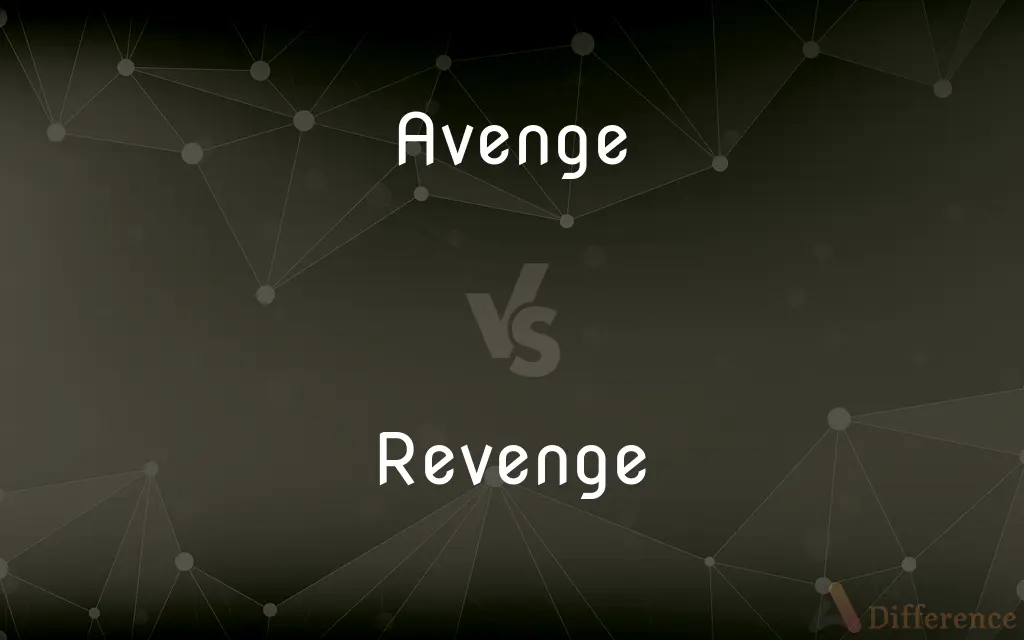Avenge vs. Revenge — What's the Difference?
By Tayyaba Rehman — Updated on October 3, 2023
Avenge implies exacting justice on behalf of another, while Revenge involves retaliation for one's own grievances or wrongs.

Difference Between Avenge and Revenge
Table of Contents
ADVERTISEMENT
Key Differences
When exploring the dichotomy between Avenge and Revenge, we unearth specific connotations and applications of each term. Avenge often finds its utilization in the context of administering justice or retribution on behalf of someone else. Alternatively, Revenge primarily concerns itself with personal retribution, aimed at satisfying the individual's own sense of injustice or malice.
While both Avenge and Revenge encapsulate forms of retribution, the underlying motivations and implications often diverge distinctly. Avenge is typically framed positively, seen as an act of bringing justice or defending the honor of another. In contrast, Revenge tends to harbor a more negative connotation, frequently intertwined with spite and personal vendetta.
A subtle, yet palpable ethical gradient often materializes when considering Avenge in juxtaposition with Revenge. Avenge, by its nature, often hints at a moral or ethical imperative, the act is perceived as righting a wrong done to another. Conversely, Revenge can sometimes skew towards ethical ambiguity, as the motivations may stem from personal vendettas rather than principled justice.
It's vital to comprehend that while Avenge generally externalizes the cause, aiming to redress a grievance done to another, Revenge personalizes the cause, seeking retribution for a personal affront or harm. Thus, Avenge occasionally presents as more altruistic in nature, while Revenge may mirror selfish or self-serving undertones.
Elegantly, literature and historical narratives often romanticize Avenge, presenting it as a noble pursuit of justice for another. Contrarily, Revenge frequently finds itself painted with darker strokes, representing a potentially destructive pursuit, motivated by personal animus and often leading to perpetuating cycles of retaliation.
ADVERTISEMENT
Comparison Chart
Connotation
Often positive or just
Generally negative or malicious
Focus
Others
Self
Ethical Implication
Tends to imply morality
Often implies personal vendetta
Motivation
Likely externalized
Inherently personalized
Societal Perception
Somewhat noble or honorable
Can be seen as spiteful
Compare with Definitions
Avenge
Exacting satisfaction for a wrong by punishing the wrongdoer.
She vowed to avenge the injustice done to her family.
Revenge
A form of retaliatory action against a person or group.
The scorned queen sought revenge against her enemies.
Avenge
To inflict penalty or retribution for the wrong done.
The hero avenged the destruction of the village.
Revenge
To exact punishment for a perceived wrong.
She plotted revenge against those who lied to her.
Avenge
To inflict harm in return for (an injury or wrong).
He sought to avenge his brother's murder.
Revenge
To inflict injury in return for an insult.
Out of spite, he sought revenge against his ex-friends.
Avenge
To bring about justice for a wrong.
The knight aimed to avenge the fallen.
Revenge
The action of hurting or harming someone in return for an injury or wrong.
He took revenge on his betrayer.
Avenge
To vindicate by inflicting pain or harm on the perpetrator.
He hoped to avenge the dishonor by dueling.
Revenge
Obtaining satisfaction by inflicting harm in retaliation.
His revenge was swift and merciless.
Avenge
Inflict harm in return for (an injury or wrong done to oneself or another)
He vowed in silent fervour to avenge their murders
Revenge
Revenge is defined as the act of committing a harmful action against a person or group in response to a grievance, be it real or perceived. Francis Bacon described revenge as a kind of "wild justice" that "does...
Avenge
To inflict a punishment or penalty in return for; revenge
Avenge a murder.
Revenge
To inflict punishment in return for (injury or insult).
Avenge
To take vengeance on behalf of
Avenged their wronged parents.
Revenge
(Archaic) To seek or take vengeance for (oneself or another person); avenge.
Avenge
(transitive) To take vengeance (for); to exact satisfaction for by punishing the injuring party; to vindicate by inflicting pain or evil on a wrongdoer.
To avenge the murder of his brother
Revenge
The act of taking vengeance for injuries or wrongs; retaliation
Took revenge on her tormentors.
Avenge
(reflexive) To revenge oneself (on or upon someone).
Revenge
A desire for revenge; spite or vindictiveness
He did it out of revenge.
Avenge
To take vengeance.
Revenge
An opportunity to retaliate, as by a return sports match after a defeat
After the loss, he demanded that he be given his revenge.
Avenge
To treat revengefully; to wreak vengeance on.
Revenge
Something done in retaliation, especially a defeat of a rival who has been victorious.
Avenge
(archaic) An act of vengeance; a revenge.
Revenge
Any form of personal, retaliatory action against an individual, institution, or group for some alleged or perceived harm or injustice.
Indifference is the sweetest revenge.
When I left my wife, she tried to set fire to the house in revenge.
Avenge
To take vengeance for; to exact satisfaction for by punishing the injuring party; to vindicate by inflicting pain or evil on a wrongdoer.
He will avenge the blood of his servants.
Avenge, O Lord, thy slaughtered saints, whose bonesLie scattered on the Alpine mountains cold.
He had avenged himself on them by havoc such as England had never before seen.
Revenge
A win by a previous loser.
Avenge
To treat revengefully; to wreak vengeance on.
Thy judgment in avenging thine enemies.
I avenge myself upon another, or I avenge another, or I avenge a wrong. I revenge only myself, and that upon another.
Revenge
(transitive) To take revenge for (a particular harmful action) or on behalf of (its victim); to avenge.
Arsenal revenged their loss to Manchester United last time with a 5–0 drubbing this time.
Avenge
To take vengeance.
Revenge
To take one's revenge (on or upon someone).
Avenge
Vengeance; revenge.
Revenge
To take vengeance; to revenge itself.
Avenge
Take revenge for a perceived wrong;
He wants to avenge the murder of his brother
Revenge
To inflict harm in return for, as an injury, insult, etc.; to exact satisfaction for, under a sense of injury; to avenge; - followed either by the wrong received, or by the person or thing wronged, as the object, or by the reciprocal pronoun as direct object, and a preposition before the wrong done or the wrongdoer.
To revenge the death of our fathers.
The gods are just, and will revenge our cause.
Come, Antony, and young Octavius, come,Revenge yourselves alone on Cassius.
Revenge
To inflict injury for, in a spiteful, wrong, or malignant spirit; to wreak vengeance for maliciously.
Revenge
To take vengeance; - with
Revenge
The act of revenging; vengeance; retaliation; a returning of evil for evil.
Certainly, in taking revenge, a man is even with his enemy; but in passing it over he is superior.
Revenge
The disposition to revenge; a malignant wishing of evil to one who has done us an injury.
Revenge now goesTo lay a complot to betray thy foes.
The indulgence of revenge tends to make men more savage and cruel.
Revenge
Action taken in return for an injury or offense
Revenge
Take revenge for a perceived wrong;
He wants to avenge the murder of his brother
Common Curiosities
Can seeking Revenge be healthy?
Often, it’s considered psychologically unhealthy due to the potential for obsessive and harmful behaviors.
Is Avenge always violent in nature?
Not necessarily; avenge can also involve lawful or moral means of securing justice.
Does Avenge always involve direct conflict?
Not always, avenging can occur through various means, including legal actions.
Is Revenge always premeditated?
Not always, revenge can also be impulsive or emotionally driven.
Can Revenge be justified ethically?
Ethics can be subjective, but revenge, especially when harmful, is often viewed negatively.
Can Avenge and Revenge be used interchangeably?
While similar, they typically differ in connotation and focus (others vs. self).
Can Avenge be personal as well?
While generally external, avenge can involve personal elements, especially in defense of loved ones.
Can Revenge ever be altruistic?
Revenge is typically self-oriented but can coexist with a perceived sense of justice for others.
Can Revenge stem from love?
Yes, revenge can be motivated by love or perceived betrayal thereof.
Can Avenge be negative?
Depending on context and approach, seeking to avenge can also have negative connotations.
Does Avenge imply a sense of duty?
Often yes, avenge generally carries a tone of obligation or moral duty.
Share Your Discovery

Previous Comparison
Perfunctory vs. Peremptory
Next Comparison
Plain vs. PlaneAuthor Spotlight
Written by
Tayyaba RehmanTayyaba Rehman is a distinguished writer, currently serving as a primary contributor to askdifference.com. As a researcher in semantics and etymology, Tayyaba's passion for the complexity of languages and their distinctions has found a perfect home on the platform. Tayyaba delves into the intricacies of language, distinguishing between commonly confused words and phrases, thereby providing clarity for readers worldwide.
















































